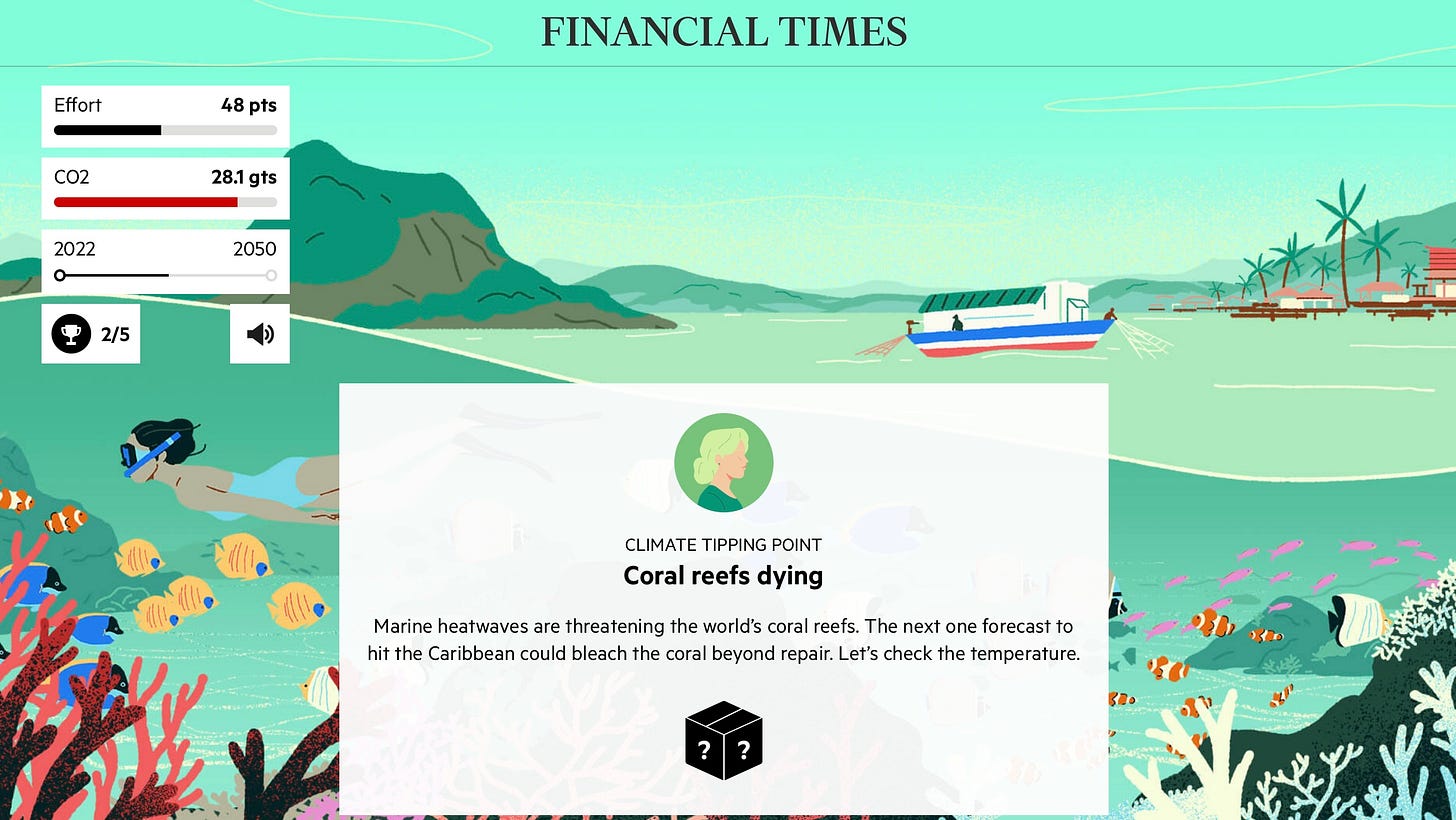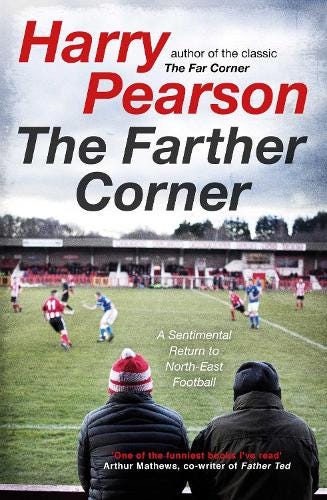30 April 2022. Climate | Football
Playing the climate game, literally. It’s tough to get to 1.5 degrees. // Celebrating football’s fans.
Welcome to Just Two Things, which I try to publish daily, five days a week. Some links may also appear on my blog from time to time. Links to the main articles are in cross-heads as well as the story. Recent editions are archived and searchable on Wordpress. I’m back on Tuesday, after the UKBank Holiday. Have a good weekend.
1: Playing the climate game, literally. It’s tough to get to 1.5 degrees.
It’s a long weekend, at least in the UK. So, for those who have a little more time on their hands, here’s a quick piece about the Financial Times Climate Game, which is outside of the paywall.
It’s a well designed simulation that invites you to make a series of decisions to see if you can get to below 1.5 degrees of global warming by 2050, helped along by an adviser (you get to choose, and as far as I can tell, your choice of adviser has some effect on some of the options you get presented with.) You have a bank of points to spend. Some decisions earn points, others lose them.
I’m not going to spoil it, but I’ve played it a few times, and it’s hard to get the balance right. If you go too fast, you spend your bank of political will. If you go you slowly, you find that the public mood is changing faster than you are. Either way you end up sacked.
The questions are worthwhile too—some options are clearly the kind of things that Bolsonaro would do, but others are finely balanced in the trade off between impact and cost. There’s also a fair sprinkling of climate-techno silver bullet babble.
It keeps track of your emissions score as you go along, and at the end of each of the first two rounds, it stops to let you see how you’re doing. And every so often, a climate shock comes along that you might need to respond to.
I recommend it. It’s well worth 10 minutes of your time this weekend.
And if you’re interested in the whys and hows of how the game came to be developed, the FT’s Visual Stories Editor, Sam Joiner, explains the background in a piece in the paper.
2: Celebrating football’s fans
We’re getting towards the end of the football season, when fans who care about such things—or at least those whose teams have a chance of being relegated or promoted—start to pore over their league tables and calculate all the permutations that could see their team succeed, or fail.
Which is a good moment to mention the football writer Harry Pearson and his recentish book The Farther Corner, a sequel to his 1990s book The Far Corner, which involved visiting mostly lower league football games in the north-east of England. That might sound unpromising, but his eye for football fans, his obvious love of the game, and his affectionate humour made it an outstanding sports book.
A couple of decades later, and maybe a thousand miles behind, Pearson finds himself back in the northeast as a single parent with a teenaged daughter after his marriage breaks up. And he finds himself returning to, and writing about, the region’s lower league football grounds, this time as a form of therapy, even as a place where he can belong.
Pearson loves the game, in all its forms, and its history. He also loves its spectators, and some of the dialogue he catches at matches verges on the Pinteresque. The Farther Corner has the classic form of “a diary of the season”: anticipation, then hope, followed by (for most fans) disappointment, or sometimes relief.
He starts in August at an FA Cup Extra Preliminary Round between Newcastle Benfield and Stockton Town, and finishes in April at Newcastle University vs Killingworth in the Bay Plastics Northern Football Alliance Premier Division. Somewhere along the way Dunston UTS, his favourite team (as a spectator—as a fan he also has Middlesbrough steeped in his blood) wins the Northern League.
Each of these chapters is also a journey. This is true both literally (we learn a lot about the region’s trains and buses) and metaphorically. Each chapter links to a set of stories; about the history of the game, about famous names like Brian Clough, who played for Middlesbrough and Sunderland before a career-ending tackle, to players who might be regarded as ‘stalwarts’, and therefore much loved by fans. There’s also quite a lot of social observation about the towns and villages where he goes to watch the games, and the recent history of the north-east, and its industrial closures: mines, steelworks, chemical factories.
There are stories about players, about managers, about owners. But what shines through, especially at lower league grounds, where you can hear pretty much everything, is the spectators.
There’s the man who pretends he’s phoning in match reports every 15 minutes; the bloke who describes every incident out loud, as if to a blind companion, but is there on his own; the stream of wisecracks directed against the referees.
The matchday programmes, and their cliches, also get their share of attention:
”Without exception every squad has at least one of the following:
- A versatile defender who is comfortable across the whole of the back line
- A speedy wing man whose direct style unnerves defences
- A midfielder who relishes a tackle and is a favourite of the fans
- An experienced, no–nonsense, imposing centre back who is the linchpin of the side.”
Woven though all of this is a deep love of the whole experience of the game, told with a lot of humour and a certain amount of self-deprecation. Pearson goes to a game between Hartlepool and Salford United with his German friend ‘The Professor’, who rated an FA Cup game between Hartlepool and Blyth Spartans as the second best he’d seen in his life. (The best was watching the World Cup match where Germany beat Brazil 7-1). They arrive as the crowd is leaving, which makes the Professor suspect that Pearson is taking him in the wrong direction, so he stops someone:
"Which way is Victoria Park? "The bloke gestured back the way he’d come. "But the game just finished,” he said. I winced.
"Ah, I see,” the Professor said. "And what was the score?"
I hoped the Pools fan would help me out a little here, say, "Nils each. Bloody shite. Complete waste of money."
Instead he flashed a wide grin: "Won 3-2. Goal in the last minute. Fucking Brillo."
Football fans also have long memories, even inter-generational memories. One of the games that Pearson recalls attending as a Middlesbrough fan, in 2018, was between Hartlepool and Wrexham. Hartlepool were in financial distress and needed £140,000 to avoid liquidation. But, back in the 1980s , when Middlesbrough had financial trouble, Hartlepool had helped out by lending them their ground.
So the club appealed to Middlesbrough fans to help them out, and they did, in their thousands, turning up for the game, which was a sell-out:
When the PA played the traditional ‘Pools pre-match song ‘Two Little Boys’ and the crowd sang along, "Do you think I would leave you dying…", I'm sure I wasn't alone in finding I'd got something in my eye.
But this is football, and this is Harry Pearson. The team played badly, and the fans were quiet. They were losing 2-0 with 15 minutes to go when a woman fan of a certain age got to her feet:
“Yees are fucking shite. A fucking disgrace to this club, these fucking fans and this fucking town. You should be fucking shot, the fucking a lot of yees." When she sat down, a woman in front of me rose and called out, "E Angela, you’ve been that quiet I thought you weren’t here."
For the truly committed reader, there’s a longer version of this post at my intermittent culture and sports blog Around the Edges.
j2t#307
If you are enjoying Just Two Things, please do send it on to a friend or colleague.






